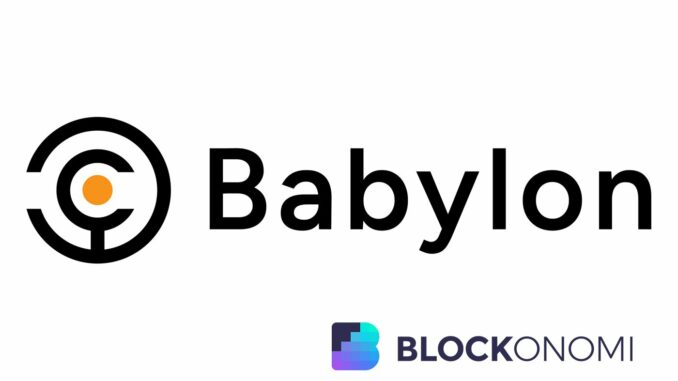
TLDR
Babylon, a Bitcoin staking platform, completed its second staking round on October 8, 2024
Deposits increased from about 1,000 BTC to approximately 24,000 BTC ($1.5 billion)
The staking round lasted for 10 Bitcoin blocks, with a 500 BTC per transaction limit
Babylon aims to provide Bitcoin’s security to new protocols and decentralized applications
The platform’s success suggests growing demand for DeFi ecosystems on the Bitcoin blockchain
On October 8, 2024, Babylon, a Bitcoin staking platform, completed its second staking round with a significant increase in deposits.
The platform, which aims to provide Bitcoin’s security to new protocols and decentralized applications, saw its total deposits rise from about 1,000 BTC to approximately 24,000 BTC, equivalent to $1.5 billion.
The staking round, dubbed “Cap-2,” was structured as a duration-based event. It lasted for about 10 Bitcoin blocks, which took roughly one hour and 23 minutes to complete.
During this time, users were allowed to add staking deposits to the platform with a limit of 500 BTC per transaction.
David Tse, Babylon’s co-founder and a Stanford University engineering professor, expressed surprise at the level of participation.
“The inflows were way beyond our expectations,” Tse stated in an email to CoinDesk.
According to Babylon’s staking dashboard, by 20:03 UTC (4:03 p.m. ET) on the day of the event, 18,601 BTC had already been staked.
An additional 5,419 BTC was pending in the staking queue, bringing the total close to the reported $1.5 billion mark.
This successful staking round marks a significant change from Babylon’s initial opening in August. During that first round, the cap was set at a fixed 1,000 BTC and was filled in just over an hour.
1,000 BTC cap filled in 6 blocks (~74 mins):
12.74K unique staker addresses participated.
20.61K staking transactions processed.
— Babylon (@babylonlabs_io) September 25, 2024
The recent round’s structure allowed for a much larger influx of deposits over a similar timeframe.
Babylon’s platform is designed to allow proof-of-stake chains to access capital from the large reserves stored in Bitcoin.
This approach is part of a broader trend to introduce more utility to the Bitcoin blockchain, a feature that has been more common on networks like Ethereum and Solana.
The substantial uptake in Babylon’s second staking round may indicate a growing demand for decentralized finance (DeFi) ecosystems built on top of the Bitcoin blockchain.
Traditionally, such ecosystems have been more associated with alternative networks, but Babylon’s success suggests that there is significant interest in expanding these capabilities to Bitcoin.
Babylon has been attracting attention in the cryptocurrency space for some time. In May 2024, the project completed a $70 million funding round, which followed an $18 million round in December 2023.
These substantial investments highlight the industry’s interest in projects that aim to enhance Bitcoin’s functionality beyond its primary use as a store of value or medium of exchange.
The platform’s approach to staking represents a new direction for Bitcoin-based projects. By allowing users to stake their Bitcoin, Babylon creates a bridge between Bitcoin’s established security and newer blockchain protocols.
This could potentially open up new opportunities for Bitcoin holders to participate in the growing world of decentralized applications and services.





 Bitcoin
Bitcoin  Ethereum
Ethereum  Tether
Tether  XRP
XRP  USDC
USDC  Solana
Solana  TRON
TRON  JUSD
JUSD  Dogecoin
Dogecoin
Be the first to comment